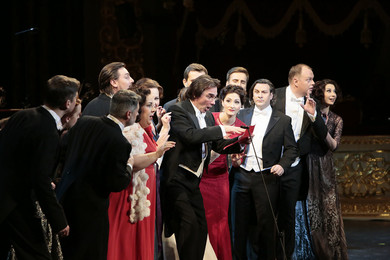Main Stage
| 3 March |
| 19:00 |
| 2010 | Wednesday |
|
Il viaggio a Reims Opera in 2 acts
|
|
Performed in Italian (with synchronised Russian supertitles) World premiere: Mariinsky Theatre, St Petersburg Premiere of this production: 13 Apr 2005 The performance has 1 intermission Running time: 2 hours 40 minutes
Performed in Italian with synchronised Russian supertitles
•World Premiere: 19 June 1825, Theatre Italien, Paris
Il viaggio a Reims, ossia L’albergo del giglio d’oro (The Journey to Reims, or The Hotel of the Golden Fleur-de-lis) is an operatic dramma giocoso in one act by Gioacchino Rossini to an Italian libretto by Luigi Balocchi, based in part on Corinne, ou L’Italie by Mme de Stael.
Written in connection with the celebration of the coronation of the French King Charles X in 1825, the work has been critically acclaimed as one of Rossini’s finest compositions. It is nevertheless a demanding work, requiring 14 soloists (three sopranos, one contralto, two tenors, four baritones, and four basses); that is one of the main reasons why it has not frequently been performed.
The composer later re-used about half of the music in Le comte Ory.
SYNOPSIS
It is 1825, and illustrious names from all over Europe have gathered at the Golden Lily Inn in order to travel to Reims and attend the coronation of King Charles X of France. Maddalena the house-keeper is exhorting her staff to get ready for the departure of the guests.
Don Prudenzio, a health attendant who calls himself a doctor, complains that the guests should not travel in their condition. Nonetheless he decides to let them go anyway.
Madama Cortese, the Tyrolean owner of the hotel, wishes that she could accompany her guests. She instructs her staff on what they should talk about with the guests so that the Golden Lily should become famous across Europe for its hospitality – discussions of fine clothes with the Contessa di Folleville, women with Belfiore, empire with Libenskof.
The first guest is a Parisian lady of fashion, the Contessa di Folleville. She is anxiously awaiting news of her carriage, when in runs Don Luigino with the news that the carriage has overturned and all her fine clothes have been ruined. The Contessa faints. Don Prudenzio and the German Baron di Trombonok enter and begin to fight over what to do to help her. Prudenzio tragically announces that the Contessa is going to die, but she instantly revives. She heroically decides not to travel, for patriotic reasons: a countess cannot be seen at a coronation without her fine clothes! She cannot hide her delight when her maid Modestina arrives with a beautiful hat salvaged from the wreckage. Trombonok laughs at the folly of the world.
Several more characters begin to arrive – the antique collector Don Profondo, the Spanish Don Alvaro and the young Polish widow the Marchesa Melibea. These last two seem delighted with each otherґs company, but suddenly the Russian general Count Libenskof bursts in and creates a scene of jealousy, challenging Don Alvaro to a duel. The situation is saved by the arrival of Corinna the poetess from Rome. Her monologue song of hope for peace and fraternal love calms everyone down.
All depart. The English Lord Sidney appears. He is secretly in love with Corinna but dares not tell her of his feelings. Don Profondo addresses a multitude of questions to the Lord, but the latter quickly makes himself scarce.
Corinna enters, soon followed by the young French chevalier Belfiore. Though he has the heart of the Contessa di Folleville, he is not averse to including Corinna in his list of conquests. Falling to his knees, he declares his love for her, but Corinna, surprised at first by his ridiculous advances, finally rejects her passionate admirer in fury.
Enter Don Profondo, who has been charged with organising the trunks for the journey. With the help of the hotel staff, he goes through the effects of his fellow travellers.
He is interrupted by the Contessa di Folleville, who is looking for Belfiore. Profondo admits that he saw him with Corinna. This angers the Contessa. Suddenly Baron Trombonok and Luigino enter, followed by the whole company, with the news that there are no horses available, and the voyage to Reims must be cancelled. The hotel guests are dismayed, but Madama Cortese brings a letter from her husband, who writes that for those who miss the festivities in Reims, there will be grand celebrations in Paris. The Contessa di Folleville invites everyone to join her in the capital. It is decided to spend the money raised for the journey on a banquet at the Golden Lily.
Trombonok, whose favourite theme is harmony, convinces Libenskof and Melibea that they are made for each other. The Count asks forgiveness for his jealousy. Melibea, harsh at first, finally forgives him.
The final scene is a grand festive divertissement to celebrate harmony, with each guest singing his or her national anthem. The scene ends with an improvisation by Corinna on the new king, Charles X. In the final song, the hotel guests sing to the glory of France.
|
|
 Mariinsky Theatre:
Mariinsky Theatre:  Mariinsky-2 (New Theatre):
Mariinsky-2 (New Theatre):  Mariinsky Concert Hall:
Mariinsky Concert Hall: 

